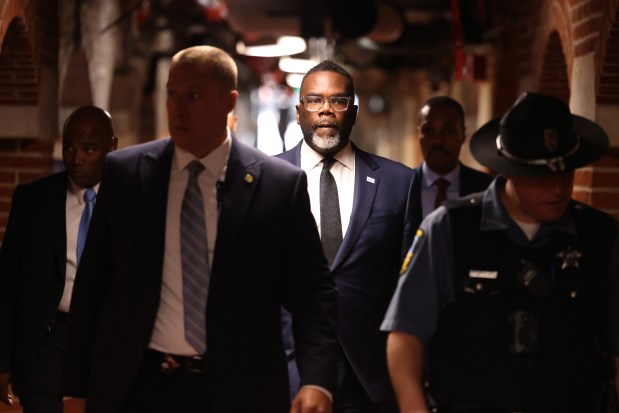The election sucked most all of Illinoisans’ attention yesterday, and rightfully so. But as we sat glued to our television sets last night waiting for results to trickle in, a time bomb was ticking in Springfield.
Gov. JB Pritzker’s Office of Management and Budget on Friday issued a report estimating that the state will face a budget hole of $3.2 billion in the fiscal year that begins next July. Politicos were anticipating a tougher budget year in 2025 than the year we just experienced, but not something that bad. If the November estimate is anywhere close to the number when the 104th General Assembly convenes early next year, Pritzker and state lawmakers will face the worst budget crisis of Pritzker’s six years in office.
And, yes, we’re including the pandemic year when the budget gap initially was wider but ultimately was addressed with billions in federal aid.
In short, Illinois faces a day of reckoning after a free-spending period under Democratic supermajorities.
Since Pritzker first took office, the state’s budget has increased by nearly a third to $53.1 billion in fiscal 2025 from $40.1 billion in fiscal 2020. The state’s economy is stuck in the mud — Illinois’ 5.3% unemployment rate is among the nation’s highest and 1.2 points more than the national rate — and government revenues are correspondingly flat. Meanwhile, the government’s costs continue to rise.
The news doesn’t get any better after next year. With no changes in terms of cost cuts or revenue increases, the deficit is projected to grow to $4.3 billion in fiscal 2027 and $5.1 billion in fiscal 2028, according to the governor’s OMB.
Those who won election on Tuesday shouldn’t celebrate too hard. The next two years in Springfield are shaping up to be rough.
The choices will be stark for Pritzker, as well as Senate President Don Harmon, D-Oak Park, and House Speaker Emanuel “Chris” Welch, D-Hillside. In the past, they’ve chosen to plug budget holes almost exclusively with tax and fee increases. The best example is the budget enacted earlier this year, which relied on $900 million in various tax hikes to balance the books. Welch was barely able to find enough votes in his caucus to pass the budget despite Democrats holding 78 of the 118 seats in the House.
If that vote was politically difficult, imagine the challenge for Welch and fellow Dems in 2025. House Republicans, who were expected to number even fewer in Springfield next year after yesterday’s election, surely won’t support any budget that relies on tax and fee hikes.
But is a tax-heavy budget what we’re going to see? Dems came close to emptying the cupboard of relatively “painless” tax and fee increases in the current fiscal year budget. Even if there are one or two of those options available for next year, they won’t come close to providing $3 billion. Unless Democrats are willing to consider a politically risky increase in the state income tax, they will have to consider significant budget cuts for the first time in the Pritzker era.
No doubt there will be discussion among Dems in Springfield about attempting for a second time to win voter approval via a referendum for a constitutional amendment allowing for a graduated income tax, which the state Constitution bars. An advisory referendum on ballots throughout the state offered a proposal to impose a 3% tax surcharge on individual income over $1 million.
This page has consistently opposed those “soak the rich” bromides, and we won’t repeat the reasons here. But whatever Springfield Dems decide about their appetite for another stab at amending the Constitution, no such panacea will be in place in time to deal with the fiscal 2026 budget.
More and more, next year is looking like a true tipping point for this one-party state. And Dems are faced with a fiscal crisis at the rapid transit agencies serving the Chicago area, to the tune of more than $700 million, as well as demands from the Chicago Teachers Union for $1 billion more for Chicago Public Schools despite a school district in need of right-sizing. If Chicago Mayor Brandon Johnson and his CTU backers still harbored any hopes for a Springfield bailout of CPS, that budget outlook surely crushed what remained of them.
Whether it’s Chicago teachers or Springfield back-benchers, now is the time for Pritzker and Democratic legislative leaders to set appropriate expectations for the coming year. Got a great idea for a new program you want to fund? Sorry, this isn’t the time.
This moment cries out for leadership. The best leaders don’t shepherd followers to where they already want to go. Great leaders face up to unpleasant truths, communicate those realities clearly, provide options to address the problem, and then require the group to choose among those options. Pritzker and company will be in Springfield next week for the annual veto session. That will be a good opportunity for some initial expectations-setting.
Simply put, it’s belt-tightening time in Illinois. Given their overwhelming majorities, Democrats don’t have to consult Republicans. But now would be an advisable moment to open the channels of bipartisan consultation and cooperation. The GOP has been thinking for far longer about areas to cut the budget than Democrats have.
Hard as it may be to believe, Welch might well need need some votes from the other side of the aisle when the moment of truth arrives.
Submit a letter, of no more than 400 words, to the editor here or email letters@chicagotribune.com.



